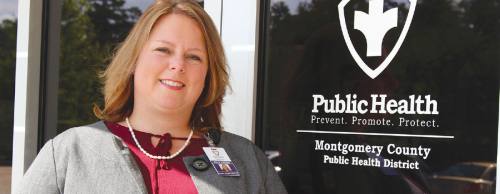 Alicia Hawkins Williams was hired in January to oversee the Montgomery County Public Health District as the new manager. The district, which was founded in the 1970s, is responsible for emergency preparedness, disease prevention, clinical services and health education in Montgomery County. It also oversees the Medical Reserve Corps program, which is a group of more than 250 trained volunteers on call to help with an emergency scenario in the county. Williams has worked in the infection prevention field since 2009, which focuses on the prevention and reduction of hospital-related infections. Although Williams initially planned to go into optometry, the infectious disease field of public health proved to be more interesting to her, she said. Williams is a Montgomery County native and graduated from New Caney High School and Texas A&M University.
Alicia Hawkins Williams was hired in January to oversee the Montgomery County Public Health District as the new manager. The district, which was founded in the 1970s, is responsible for emergency preparedness, disease prevention, clinical services and health education in Montgomery County. It also oversees the Medical Reserve Corps program, which is a group of more than 250 trained volunteers on call to help with an emergency scenario in the county. Williams has worked in the infection prevention field since 2009, which focuses on the prevention and reduction of hospital-related infections. Although Williams initially planned to go into optometry, the infectious disease field of public health proved to be more interesting to her, she said. Williams is a Montgomery County native and graduated from New Caney High School and Texas A&M University.
What are the responsibilities of the public health district?
We have a clinic where we see [tuberculosis] patients, STD patients and immunization patients. [On the second floor], we have emergency preparedness, volunteer recruiting for health and disasters, and two epidemiologists who study diseases of the population. There’s not hardly any duplication of roles in this group. [We also do public outreach] … our epidemiologists, a lot of them go to day cares for visits to educate them on what to look for. We have another epidemiologist who goes to clinics, physician offices and ERs and does the same kind of education outreach and connection with providers in the area. We get a card back from them and create a list so when we have pertinent information that we need to get out to the group, it’s already in the system. We get things from the state that we need to send out to local providers, so that’s one way we make a connection with providers in the area.
How do volunteers play a part in the emergency preparedness department?
We have a roster of 260 or so volunteers; in their normal day-to-day, they work in the medical field. They’re instrumental and an extension of the public health department. They’ll do monthly trainings, so that when we do need to pull them in, they’ve had that experience.
[During the spring floods], we needed hygiene kits delivered to south [Montgomery] County. So we called them, and a gentleman showed up with a big truck and he was able to get through some of the water. He took the forms we needed to get [to] them with the containers of hygiene kits. We had a patient with high blood pressure that needed monitoring, or maybe the Red Cross needed help, so we would tell these volunteers, ‘We need this service at this location.’
How is the district funded?
We are primarily grant funded. We have seven grants, and we also get $90,000 from [Montgomery County]. For example, we have a grant for Ebola. When [the Zika virus began], it morphed into using some of that money for Zika [purposes]; education, printouts—that sort of thing. In that instance, the grant was transferable. The funder contacts the Centers for Disease Control [and Prevention], and they approve it or not.
What partnerships do you have with other entities in the county?
In our county, we have local partners and regional partners, and we do tabletop [meetings] with them. Montgomery County Hospital District, Montgomery County Office of Emergency Management, The Woodlands Fire Department, Conroe Fire Department the Montgomery County fire marshal’s office … all the first responders get involved. Every quarter, we meet with the hospitals as well to talk about the hot topics or new guidelines and try to establish a relationship with them.
What kind of precautions should county residents take to avoid the Zika virus? Do you expect it to be a problem in the coming months?
Wear long clothing, spray mosquito repellent if you’re going to be outside and put screens on your house to prevent mosquitoes from coming inside. That’s half the battle—if you can prevent the bite. Fight the bite: That’s the slogan we use quite a bit. I think once [the area is] dry and there’s not any mosquito breeding grounds—the mosquitoes only live a short time—months from now it probably won’t be as big of a problem.





